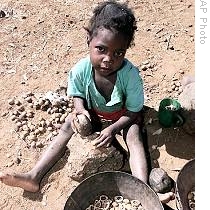Geneva
17 March 2009
The World Food Program warns the United Nations will be forced to close its West African Humanitarian Air Service on Friday because it has run out of money. WFP says the service flies UN and private aid agency humanitarian workers, journalists and others to some of the hardest-to-reach emergency operations in the world.
 |
| Abigail Mazanga, 5, uses a rock to crush mungogo nuts for food at Maunga village, 12 miles west of Livingstone, Zambia (File) |
WFP Spokeswoman, Emilia Casella says Chad is running a 92% shortfall in its annual budget of nearly $11.5 million. She says this is particularly worrying because Chad is expected to carry about 43,000 humanitarian workers, mainly to Eastern Chad, over the course of this year.
She says the Central African Republic has an 83% shortfall in its air service operations and Ethiopia's funding will give out at the end of April.
"What this really means is that aid agencies will not be able to get to the people who need help," said Casella. "It also means that the U.N. will not be in a position to do urgent medical and security evacuations in a timely manner in some of these areas."
Casella says millions of people in West Africa and beyond will be in deep trouble if the air service closes. She says there are some areas that can only be reached by air because of security concerns or impassable roads. She cites Niger as an example.
"In Niger, air services are required due to security reasons. The UN Department of Safety and Security has banned all travel by road after several mine incidents and ambushes in the north and east of the country," added Casella. "And, even where roads are passable, it can take up to four days to drive to some of the most remote locations in Niger. And, those same destinations can be reached within two hours by air."
A UN study shows it is actually more cost-effective to fly aid personnel in Niger, because vehicles take too long to get to their destination. The study finds agencies can save nearly $1,000 per passenger by flying rather than driving.
Casella says high profile emergencies tend to attract money for the air service, whereas low-profile emergencies do not. She says it makes little sense for donors to give money for food, medicine and other relief, while not providing the money for transport to get the aid workers to the people who need their help.